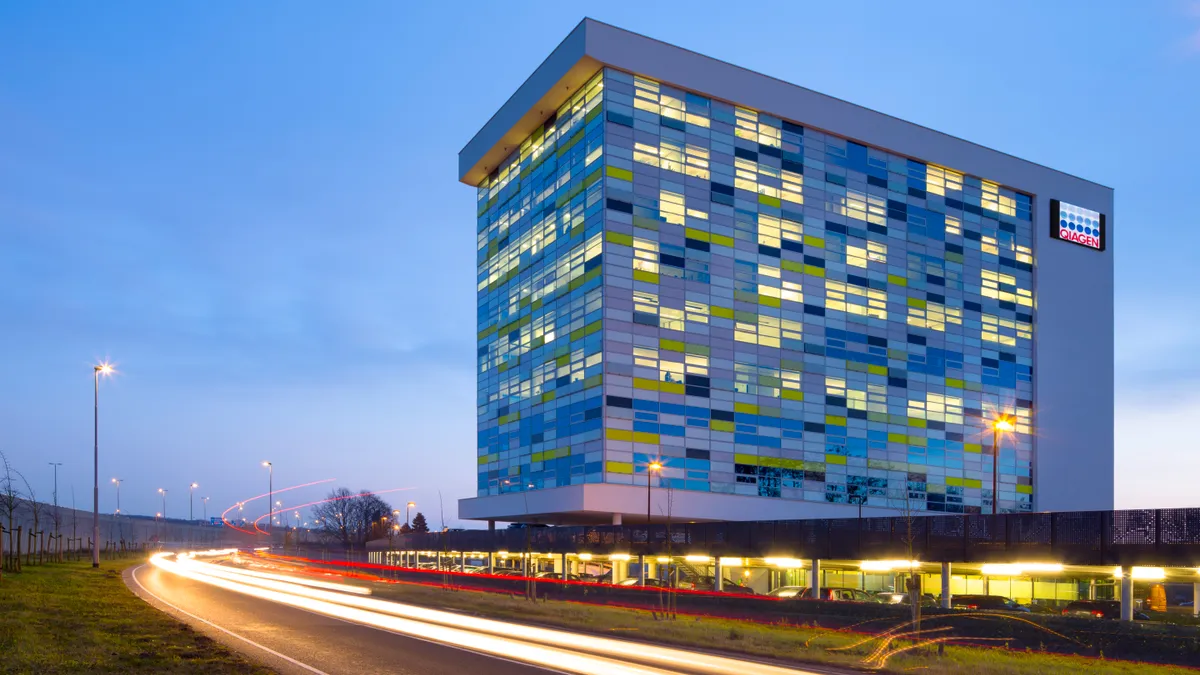Dive Brief:
- Qiagen shareholder Davidson Kempner published a letter Friday afternoon it sent to the board of the Dutch molecular diagnostics maker voicing its objection to the company's planned sale to Thermo Fisher Scientific for $11.5 billion.
- Investment management firm Davidson Kempner, which holds about a 3% stake in Qiagen, called the Thermo Fisher offer of 39 euros (approximately $43) per Qiagen share inadequate, saying it does not reflect the company's standalone value and prospects as a leader in molecular diagnostics and life sciences.
- COVID-19 has made "significantly clearer" the importance of Qiagen's testing business, the letter said. Qiagen reported preliminary second quarter results on Thursday, seeing net sales jump nearly 19% from a year ago, driven by demand for its RNA sample technology kits, reagents sold to third parties for use in their own kits, and cartridges for the QIAstat-DX platform.
Dive Insight:
The COVID-19 outbreak has cast the Thermo Fisher-Qiagen combination in a whole new light. Since the acquisition was announced at the start of March, demand for Qiagen's products used in coronavirus testing has soared.
The surge in sales compares to an organic growth rate of just 3.4% over the past decade, calculated by Cowen analysts at the time of the deal announcement. Qiagen said it is now working to expand production capacity for its highly sought-after products as well as new solutions to address the public health crisis.
Davidson Kempner argues the strategic review for the deal came at a "particularly disadvantaged point in time" for Qiagen, following a profit warning and the departure of longtime CEO Peter Schatz. The circumstances hurt the company's ability to extract fair value for shareholders, as evidenced by the opportunistic approaches received from a number of parties immediately after Schatz's departure, the firm stated in its letter. Five potential suitors held discussions with the company during the review period, according to Davidson Kempner.
Further, the board did not incorporate any impact of COVID-19 into its evaluation of the company's standalone value, the shareholder contends.
"The Company's products have become increasingly important to governments and healthcare institutions as they seek to mitigate the risk of future pathogens and protect their citizens and economies," the letter states. "Many industry experts expect that spending on this previously small part of the healthcare industry will increase substantially in the coming years given the cost effectiveness of these capabilities in managing pandemics."
Following Thermo Fisher's offer, Qiagen's share price has increased by only 21%, the shareholder said. Davidson Kempner predicts Qiagen's earnings will climb 67% for the full year 2020. If not for the bid situation, Qiagen's shares could be expected to have risen at a rate similar to its European peers, which are up an average of 61%, the letter said.
As a result, Davidson Kempner said it will not tender its shares and urged other shareholders to reject the offer and called on the board to issue an adverse recommendation change.
Thermo Fisher's approximately $11.5 billion offer includes the assumption of about $1.4 billion of net debt. The deal is expected to be finalized in the first half of 2021.
Qiagen said it will release its full second quarter results on Aug. 4.












